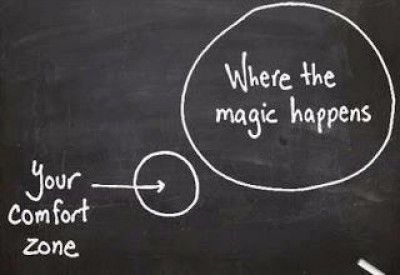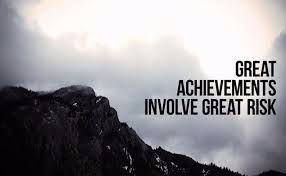
There come times in everyone's life when you're faced with a choice that involves risk. Perhaps you want to change careers, move to a different place, quit your job and start a business, begin a new relationship, have a child. Creatively, you may be faced with a choice of doing what you know is marketable or going out on a limb with your own vision, or giving up a steady job to follow your creative pursuits full-time.
Risk is, by nature, scary. It's uncertain and unpredictable. You're heading off into uncharted territory. You may lose your life savings or lose face. You risk criticism and humiliation, or having to pick up the pieces and start all over again. You're giving up what you know for what might be. The rewards can be great, but so can the cost.
So, why would anybody want to take a risk?
~ Risk gives you an opportunity to open up to your talents, interests, abilities and dreams.
~ Risk teaches you to set clear goals and follow through.
~ Risk allows you to feel powerful and proactive, making things happen rather than waiting for them to happen to you.
~ Risk opens you up to new ideas, skills, opportunities and experiences.
~ Risk allows you to grow and discover new things about yourself and the world, to develop your strengths and talents.
~ Risk allows you to conquer your fears.
~ Risk is exhilarating. It makes you come alive.
When it comes to risk-taking, there are two extremes. Some people are afraid to take even reasonable risks, wanting guaranteed results. This can result in a life that's flat and lackluster. Others take risks easily, believing that their willingness to leap makes them courageous. But taking major risks without thinking them through is foolish, and such people often find themselves picking up the pieces of shattered dreams.
According to Dan Borge, in The Book of Risk, risk means being exposed to the possibility of a bad outcome, and risk management means taking deliberate action to shift the odds in your favor. He says that we are already risk managers, since we make risk decisions every day, often without thinking about it -- things as simple as getting out of bed, lighting up a cigarette, getting in your car or putting money in the stock market.
While you don't need to agonize over every decision, it's the big, life-changing risks that we face only a handful of times in our lives that can stop us in our tracks. But if we don't step up to the challenge, we may find ourselves living a life that bores us, that has no dynamics or color. By avoiding any kind of risk, we systematically shut down our world, making it smaller, flatter and grayer.
There's no magic formula for managing risk, but with careful preparation and forethought, you can minimize risk and maximize the odds that you'll succeed.
~ Take calculated risks rather than foolish ones. Sure, they both take courage, but closing your eyes and jumping without looking where you're going is simply reckless. You need to plan and go in with your eyes open.
~ Project forward. In your mind or on paper, play out your plan. What are the potential risks? How can you prepare for them? Is there a Plan B that would give you the desired results with less risk?
~ Analyze the risk. What are the specific risks involved, and how can you minimize them? What information can you gather that will help you be better prepared? If it's a financial risk (and it always seems to boil down to that somehow, doesn't it), how can you create a buffer for yourself, such as having a year's income in the bank to fall back on?
~ Consider the timing. Your risk may be less risky with 1, 5 or even 10 years of preparation. Save money, learn skills, research, set the stage for your eventual leap. You can relieve the frustration of not actively pursuing your goal (yet) by taking steps toward it on an ongoing basis.
~ Look at the worst-case scenario. What is the worst thing that could happen if you take this risk? Is it likely to happen? If so, is there a way to modify your plan or acquire additional knowledge or resources to minimize the risk? If not, are you willing (and does it make sense) to go for it knowing the worst?
~ Look at what it's costing you to not take this risk. You may be protecting your security and maintaining the status quo, but it may be costing you your health, your relationships, your creativity, your happiness and fulfillment, your sense of aliveness.
~ There are times when you need to take a risk to be true to who you are. Is taking this risk in line with your highest values and priorities? Is not taking this risk a threat to your integrity? There are also times in your life when security or other responsibilities take precedence, such as when you need to provide for your family. In a case like that, you may postpone the risk and prepare for the time when you're ready to make your break.
~ Look before you leap. Do your research, and gather all the information you can before jumping in. Do a trial run (for example, do a "virtual portfolio" for a potential investment to see how it does over time) and see how you handle the ups and downs. Talk to others who have taken this or a similar risk. How did they do? What mistakes did they make? What did they do right?
~ Honor your level of risk tolerance. You need to have some sense that you can handle the challenges you're giving yourself. Some people can tolerate more risk than others. If you bite off too much, you're likely to end up sabotaging yourself. Start small, and build up your risk "muscle." Be honest with yourself about how much you can handle, and don't try to compete with your colleagues who have a higher tolerance. Do what *you* can do, and make peace with that.
~ What would this risk be worth to you even if you fail? Your risk may be an opportunity to explore your creativity, acquire new artistic and personal skills, build credentials and prestige, make new contacts, broaden your horizons and learn a lot. And there's a certain satisfaction in knowing that you went for your dream, whether you achieve it or not. Regret at never trying can be harder to live with than trying and failing. And what you learn may lead to an even bigger dream that you couldn't even see before.
~ Stay awake and keep your eye on the progress of your endeavor. When things get difficult, when your plans don't go as expected, when the bills start piling up or your investment starts losing money, there's a strong temptation to bury your head in the sand and just focus on the fun parts. By doing this, you may create even greater problems for yourself when you might have bailed yourself out by taking action sooner.
~ Don't risk everything unless you know can handle it. Trading stocks on the Internet, for example, has become an intriguing pastime. It's exciting to make a killer day trade, but it also makes it easier to lose a lot of money quickly. Since you're not actually handling cash, it feels unreal, like Monopoly money. You can lose it all in the blink of an eye. Are you prepared to do that?
~ Learn what you need to learn. Many artists striking out on their own know a lot about their craft, but little or nothing about financing and running a business. Read books. Hire experienced professionals to help you.
~ Don't feel you have to go it alone. Get help. Find partners, supporters and "strategic alliances." You may find someone else with a similar goal who's willing to pool skills and resources. You may have fans or supporters of your work who are willing to help with promotion or offer other services pro bono to help you get started. You may know a friend or colleague with a compatible, but noncompetitive business who's willing to share office or studio space and do cooperative advertising.
~ Don't let past mistakes or failures stop you. You're not the same person. You've learned from those mistakes and have greater strength and resources than you did in the past.
~ Don't make excuses. When you're up against a challenge, you're going to find lots of reasons not to do it. Evaluate which ones are real and handle them, and which ones are excuses and eliminate them.
~ Even with the "rightest" risk, be prepared to face challenges. And give it time. Staying excited about your goal will give you the impetus to plunge through the obstacles.
~ Don't overlook the obvious. If there's an obstacle staring you in the face, address it. It's likely that you can overcome it, but if you ignore it, it'll undoubtedly show up to haunt you later.
~ Be clear on your objectives, the results you want. What would be a good outcome for you? A bad one? An unacceptable risk? Temper the risk accordingly. Don't throw all your eggs in the basket, at least not all at once, if you can help it.
~ Ultimately, does it feel right to take this risk? Sometimes, your "gut" leads you into doing something that doesn't seem to make sense, but succeeds smashingly, or something that seems to be an end in itself, but turns out to be a stepping stone to a bigger goal that you couldn't foresee. Even a failure in the short-term can lead to a greater success in the long-term. Many successful entrepreneurs are veterans of failed businesses.
Whether you succeed or fail, taking a risk will stretch you and give you faith in your strength and abilities and the confidence to do even more. The risks I took 15 years ago are a walk in the park for me now, as I take on even bigger goals with their even greater risks.
Life doesn't come with guarantees. That can make it risky and perhaps scary, but it's also what makes it interesting and fun. Even if you're not a gambler by nature, there's something exhilarating about taking a risk and winning. As you go through your life, the parts that are going to stand out are not the ones where you plodded along safely and did what was expected of you. The shining memories will be the times when you took a leap of faith, whether you won or not.
In her audiotape, Instant Guts!, Joan Gale Frank says, "Even though you can come up with a dozen good excuses for why you shouldn't take a risk, there's one great big reason why you should. And that is, until you do, your heart is going to hunger. If you don't take risks, you'll never feel quite complete. Right up until the day your story ends.
"So, are you going to just sit there wondering what your life could have been like if only you took a couple of risks? Or are you going to do something about it while you still have the chance? Because when your story closes, you're going to find out that it's not what you *did* that you regret the most, it's what you didn't do!"

So, think it through, be prepared, and go for it!



